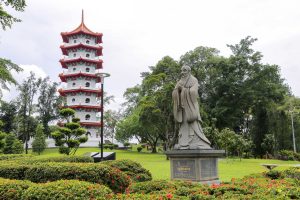Becoming a Confucian in Contemporary Singapore: The Case of Nanyang Confucian Association
September 28, 2022

The Qufu International Confucius Culture Festival is held every year between September 26th and October 10th in Qufu City, the hometown of Confucius. The Nanyang Confucian Association (NCA) was founded in Singapore in 1914 in response to a nationalistic call in China seeking to enshrine Confucianism as a state religion. The term nanyang, meaning the south sea, implicitly takes China as its geopolitical reference point. According to the first president of the NCA, the Chinese population was able to grow in number over the centuries because of the resilience of Chinese culture, which the NCA aimed to spread with the local Chinese community in Singapore. It was only in the mid-1960s that the NCA finally abandoned the rhetoric of a political motherland when referring to China. However, the term nanyang was retained, and China continued to serve as the origin of the NCA’s cultural self-identity.
In a multi-ethnic and multi-cultural society like Singapore, where the preservation of Chinese culture is a major concern for many Chinese, most agree that Confucianism should only be promoted as the core of Chinese culture if it is considered a secular school of thought. Professor Ong Chang Woei and Associate Professor Koh Khee Heong (NUS Department of Chinese Studies) explore how a segment of Singapore’s Chinese community constructs its self-identity based on how it understands Confucianism – by dismissing its religious attributes while highlighting its ethnic and cultural dimensions in ‘Becoming a Confucian in Contemporary Singapore: The Case of Nanyang Confucian Association’ (Religions, 2021).
Unlike countries like Indonesia, in Singapore, a person’s religious identity does not affect their citizenship. Therefore, the main concern of becoming a Confucian in Singapore is having to highlight one’s Chineseness in a multi-ethnic, multi-cultural, multi-religious, and multi-lingual society.
By tracing the history of the NCA, Prof Ong and A/P Koh assert that its leaders intended to position themselves at the centre of global Confucian activism. In particular, one president of NCA, Kek Boon Leong, attempted to construct a Confucian temple in Singapore, arguing that as the most established Confucian society in Singapore, it was up to the NCA to shoulder the responsibility of creating a monument in the name of Confucius. Though the planned establishment was unmistakably a place for worship, the NCA insisted that the temple was non-religious as they did not want the NCA to be seen as a religious sect.
Kek also protested against the decision to build a grand Protestant church in Qufu, the birthplace of Confucius. Although Kek was a Singaporean citizen, he believed that any person who is ethnically Chinese should stay true to their Confucian roots. They should thus have the right to make their opinions on cultural matters in China known. In this manner, under the mantle of leaders like Kek, the NCA attempted to portray itself as a major player of what it perceived to be the “real” Confucian way and authentic Chinese culture.
Read the article here.
